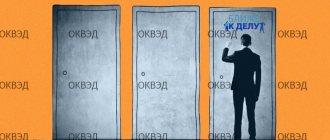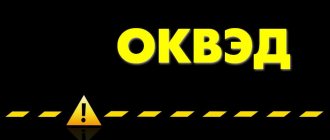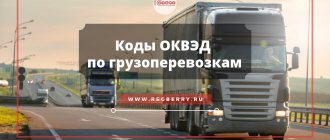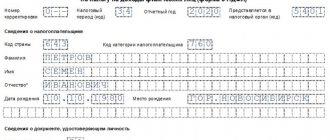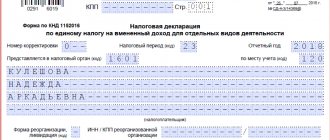Expert opinion
Lawyer Consultant
I will select or check OKVED for free
Help with OKVED
Additions are constantly made to the All-Russian Classifier of Types of Economic Activities and it is always updated. It is very important to correctly select and indicate the correct OKVED code when registering. I am ready to help you for free with the selection and verification of the OKVED code
OKVED codes are a specific sequence of numbers in which the type of economic activity of an organization is encrypted. From the code you can understand what the company does: construction, agriculture, trade, provision of services.
Currently there is a list of OKVED codes version OK 029-2001 (NACE edition 1). This list is valid until January 1, 2021. The document is valid on the basis of Letter of the Federal Tax Service dated August 18, 2014 N SA-4-14/16465.
Examples of selecting OKVED codes depending on the chosen field of activity
The applicant’s idea of the proposed activity codes does not always coincide with the logic of the structure of the OKVED classifier. For example, it is understandable when it comes to activities related to the rental of apartments and offices. The following OKVED codes are suitable:
- 68.20 Rent and management of own or leased real estate
- 68.20.1 Rent and management of own or leased residential real estate
- 68.20.2 Rent and management of own or leased non-residential real estate
Also, quite logically, activities related to trade or the provision of taxi services are structured. But, for example, a designer associated with Internet advertising can work under the following OKVED codes:
- 18.12 Other types of printing activities
- 74.20 Activities in the field of photography
- 62.09 Activities related to the use of computer technology and information technology, other
- 73.11 Activities of advertising agencies
- 73.12 Representation in the media
- 90.03 Activities in the field of artistic creativity
- 90.01 Performing arts activities
- 62.01 Computer software development
As you can see, when selecting suitable OKVED codes, it is not always possible to limit yourself to one class or classifier group. We recommend that you use a special selection of OKVED codes by type of business:
Ready-made sets of OKVED codes by type of business
What is OKVED and where to get it
The first attempt at coding by type of activity in the Russian Federation was carried out at the beginning of 2001 (OK 029–2001). As an addition to it, OK 029–2007 was released in 2007, which is applicable in narrow areas. Currently, OKVED 2 or OK 029–2014 (NACE Rev. 2) has been introduced.
It is important that the first edition of the classifier has not been canceled to date. This means that those entrepreneurs who filled out information about the type of activity according to OK 029–2001 do not have to correct anything. The publication of a new edition of OKVED was caused by the refinement of discrepancies identified during the application process, the spread of such activities as business on the Internet, and changes in the licensing of certain goods.
The selection of suitable OKVED codes often falls on the shoulders of the chief accountant or financial director of the company
List of economic activity codes
A single classifier looks like an ordinary table, only very large. If you study the document, you can understand that it covers all areas of possible activity of an entrepreneur. The areas of application of OKVED are, first of all, statistics and accounting.
The type of activity you define in the specified encoding determines the amount of social contributions and allows you to receive payments in the event of force majeure circumstances. Using this code, the tax service has the opportunity to compare the taxes paid by a particular company with the industry average.
How many OKVED codes can be indicated in the application?
As much as you like, it is not forbidden to include at least the entire Classifier in the application (the only question is how much you need it). In the sheet where OKVED codes are indicated, you can enter 57 codes, but there can be several such sheets, in this case the main type of activity is entered only once, on the first sheet.
Please note that if the OKVED code you have chosen relates to the field of education, upbringing and development of children, medical care, social protection and social services, youth sports, as well as culture and art with the participation of minors, then to register an individual entrepreneur you will need a certificate of no criminal record (clause 1(k) of article 22.1 of law No. 129-FZ). The document is submitted upon an interdepartmental request, but in order not to delay the registration process, you can, after checking with the registration inspection about this possibility, request a certificate in advance.
The law stipulates this requirement only for individuals, that is, individual entrepreneurs, and when registering an LLC such a certificate is not required.
How to add OKVED via MFC
Submitting an application through the MFC is actually no different from submitting this document directly to the Federal Tax Service.
If the entrepreneur himself came to the MFC, he will have to sign the application in the presence of a center employee. Accordingly, this should be done after the operator checks that the document is filled out correctly.
We recommend including several copies of form No. P24001 in the package of documents for a visit to the MFC. They will be useful if a center employee discovers errors or inaccuracies in the completed form. Having blank forms will allow you to immediately make the necessary corrections.
If the application to the MFC is submitted by the entrepreneur’s authorized representative, then the individual entrepreneur’s signature on this document will have to be certified in advance by a notary. The representative will also need a power of attorney certified by a notary. In this case, it will no longer be possible to promptly correct errors discovered during acceptance of the application.
REFERENCE. Not all multifunctional centers provide the same range of services. Using a special service, you can check whether the MFC accepts an application to add OKVED codes for individual entrepreneurs in 2021.
If form No. P24001 is sent through the multifunctional center, documents confirming the entry of the new OKVED code can also be obtained from the MFC (clause 3 of Article No. 129-FZ).
Responsibility for conducting activities not in accordance with OKVED
As such, there is no liability for activities not in accordance with OKVED. Both judicial practice and letters from the Ministry of Finance confirm that an entrepreneur is not subject to liability for carrying out activities not specified in the Unified State Register of Individual Entrepreneurs or the Unified State Register of Legal Entities.
At the same time, if you operate under an OKVED code that is not registered or was not entered later, you may be brought to administrative liability in the amount of up to 5,000 rubles under Art. 14.25 of the Code of Administrative Offenses of the Russian Federation for “...failure to submit, or untimely submission, or submission of false information about a legal entity or an individual entrepreneur.” OKVED codes are included in the list of such mandatory information in Art. 5 (5) of Law No. 129-FZ of 08/08/01, so you will need to hurry to make changes within three days after the start of activities under the new code.
Answers to frequently asked questions
Question N1: Hello! I am an individual entrepreneur. Can I use the simplified tax system if all the OKVED codes that I chose during registration allow this? Or there are additional restrictions. (click to expand)
Answer: In order to determine whether you have the right to keep accounting and tax records under the simplified tax system, it is necessary that the number of your employees does not exceed 100 people, and your income for nine months does not exceed 112.5 million rubles. Also, under the simplified tax system, the residual value of fixed assets cannot be more than 150 million rubles.
Main activity according to OKVED
But here you need to be careful. The fact is that the calculation of contributions for workers for insurance against industrial accidents and occupational diseases occurs according to the tariffs for the main type of activity. The more risky (traumatic or provoking occupational diseases) the activity is, the higher the insurance premium rate.
Before April 15 of the year following the reporting year, employers must submit to the Social Insurance Fund documents confirming the main type of activity, in the manner prescribed by Order of the Ministry of Health and Social Development No. 55 of January 31, 2006. Organizations submit such confirmation annually, and individual entrepreneurs - employers only if they have changed their main type of activity. The main type of activity is considered to be the type of activity from which the income received is higher in comparison with the income from other activities for the previous year.
If confirmation is not submitted, then the FSS sets the highest tariffs of all types of activities specified by the policyholder, and this is where excessively specified OKVED codes can turn out to be very inappropriate.
Which document contains a list of all OKVEDs of a company or individual entrepreneur?
The result of all work to obtain codes should be such a certificate - an extract from the Unified State Register of Legal Entities indicating OKVED.
Extract from the Unified State Register of Legal Entities indicating OKVED - page 1
On the second sheet of the Unified State Register of Legal Entities extract, all OKVED codes are indicated, showing what activities a company or individual entrepreneur can carry out.
Extract from the Unified State Register of Legal Entities indicating OKVED - page 2
How are tax regimes and OKVED codes related?
All special, or preferential, tax regimes (USN, Unified Agricultural Tax, PSN) have restrictions on the type of activity. If you intend to engage in certain types of activities and at the same time choose a mode in which such activities are not provided, then there is a conflict of interest. It will be necessary to change either the tax regime or the desired OKVED. To avoid getting into such a situation, we recommend that you consult with experts in advance on the issue of choosing an appropriate taxation system.
Free tax consultation
For example, under the simplified tax system 2021 it is impossible to carry out insurance activities, extract minerals, except for common ones, or produce excisable goods, except for grapes and wines made from them. On PSN you can only provide certain types of services and engage in retail trade with restrictions.
Read more: Types of activities covered by patent in 2021 for individual entrepreneurs
Unified agricultural tax is generally intended only for activities related to agriculture and fisheries. The general taxation system (OSNO) has no restrictions related to types of activities, but it has the highest tax burden.
Transition to simplified tax system
According to the Tax Code of the Russian Federation, the transition to the simplified tax system is carried out at the beginning of the year. To do this, a representative of an organization or an entrepreneur must send a corresponding application to the tax authority no later than the first working day of the new year. In this case, one should be guided by the fact that the conditions for the simplified tax system are met. We will indicate what these conditions are below:
- Annual income limit: no more than 150 million rubles;
- Limitations on the average number of employees: no more than 100 people;
- Limitations on the residual value of fixed assets: no more than 150 million rubles;
- Limitations on the equity participation of other companies: the share of other organizations in the authorized capital does not exceed 25%.
The Russian Tax Code provides for the transition to a “simplified tax” only for certain types of activities established on the basis of the latest edition of OKVED.
Tax disputes related to activities under an unspecified OKVED code
The entire “reinforced concrete” logic of tax officials is based on their constant desire to not recognize the taxpayer’s right to a tax benefit or to reduce the tax base. Everything comes into play here, including the refusal to accept expenses for transactions with counterparties if they do not indicate the type of activity for which the business transaction took place.
Most often, such refusals are associated with the recognition of expenses when calculating income tax and VAT refund. Judges in such disputes, as a rule, side with the businessman, but if you do not want to bring the matter to court, then it is better to make sure that your partner has the required OKVED code.
Another important point is when tax authorities unreasonably try to prove that activities under an unspecified OKVED code are, in principle, not entrepreneurial. In particular, there are known denials of the right to apply a tax rate of 6% for an entrepreneur on the simplified tax system for income if he received this income under unspecified OKVED codes. The Federal Tax Service is trying to tax such income with personal income tax at a rate of 13%, as received by an individual from activities not related to business.
Elena Mikheeva, lawyer at legal
What are OKVED codes? What are they needed for? By what principles are they selected? Why are they updated regularly?
The All-Russian Classifier of Types of Economic Activities (OKVED) was developed by the Ministry of Economic Development and is part of the national standardization system of the Russian Federation.
Without OKVED, it is difficult for the state to determine the tax rate, collect and analyze statistical information about each type of business activity. With the help of codes it is easier to systematize, classify and encrypt any type of work, develop regulations and regulate economic activity.
The development of updates to OKVED is ensured by the Ministry of Economic Development in accordance with the Standardization Rules PR 50.1.024-2005 “Basic provisions and procedure for carrying out work on the development, maintenance and use of all-Russian classifiers.” Updates to OKVED are made taking into account current changes in legislation, technical regulations, national standards, changes in international classifications and other legal acts.
Why do you need to choose primary and secondary activities?
An economic entity may carry out one or more types of economic activities described in one or more sections of OKVED (Order of Rosstat dated December 31, 2014 No. 742 “On guidelines for determining the main type of economic activity of economic entities based on the all-Russian classifier (OKVED 2) for the formation of a consolidated official statistical information").
The main type of economic activity creates the largest part of the gross added value of a legal entity or individual entrepreneur. A secondary economic activity is any other additional activity producing goods and services.
Based on extracts from the Unified State Register of Legal Entities, state statistics bodies keep records of legal entities in the Statistical Register of Rosstat and their identification according to the codes of all-Russian classifiers. As part of the information from the Unified State Register of Legal Entities, OKVED codes are provided, which are determined by business entities independently and indicated in the application for state registration. In this case, the first code declared is considered the main one.
What depends on the main OKVED code, except for contributions for injuries?
When choosing the main OKVED code, special attention should be paid to individual entrepreneurs who plan to hire workers, since insurance contributions to various funds are deducted from employee salaries. The Social Insurance Fund sets the rate of contributions “for injuries” based on the main activity. The more risky the type of activity according to OKVED, the higher the contribution rate will be.
What restrictions exist for individual entrepreneurs?
In Russia, there are prohibited types of activities for individual entrepreneurs - these are the economic, defense, military and financial spheres. This also includes all types of business that can harm the health and life of the population: the sale and development of military products, narcotic and toxic substances, explosive elements and mixtures, drinks containing alcohol, etc. This prohibited list is constantly reviewed and expanded.
Conducting business according to the law. Services for individual entrepreneurs and LLCs
Details
How can you identify a suspicious counterparty using OKVED codes?
The reliability or unreliability of a counterparty can be checked independently on the websites of government agencies or by means of a written request to the Federal Tax Service.
What might alert the tax office?
If a company enters into an agreement with a counterparty who does not have an OKVED code corresponding to the agreement in the Unified State Register of Legal Entities, then the inspectorate may regard it as unreliable. The company may be charged with expenses and deductions set to reduce the taxable base, and may also be charged with the fact that the verification of the counterparty was not carried out properly.
Is it possible to arouse suspicion from the bank if you are engaged in a different activity than what you indicated when opening the account?
Banks may also suspect a client of unreliability if he has carried out a dubious transaction that does not correspond to his type of activity according to OKVED. In this case, the bank, in accordance with Art. 7 of Federal Law No. 115-FZ of August 7, 2001, has the right to block a current account or blacklist a company.
What happens if you specify too many activities?
The legislation does not limit the number of OKVED codes that can be specified when registering a legal entity or individual entrepreneur. If an individual entrepreneur has decided to make changes to the types of activities, then the registration authority must submit form P24001 within three working days (Clause 5, Article 5 of the Federal Law of 08.08.2001 No. 129-FZ “On State Registration of Legal Entities and Individual entrepreneurs").
In what cases is it necessary to change the OKVED code? What should an entrepreneur do if he decides to change his type of activity?
Changing OKVED codes is a common occurrence for business; a change in codes may be due to business expansion, adjustments to current activities to increase competitiveness in the market (in this case, a new additional OKVED is entered into those already contained in the Unified State Register of Legal Entities or Unified State Register of Individual Entrepreneurs), or a legal entity or individual entrepreneur may make a decision completely change the field of activity (in this case, the main OKVED code is changed).
How are OKVED codes related to licensing?
The objectives of licensing certain types of activities are to prevent, identify and suppress violations by a legal entity, its director and other officials, an individual entrepreneur, his authorized representatives, of the requirements established by the Federal Law of 04.05.2011 No. 99-FZ “On licensing of certain types of activities” and other federal laws. Art. 12 contains 52 types of activities subject to licensing: development, production, distribution of encryption (cryptographic) tools, activities for the technical protection of confidential information, development, production, testing and repair of aircraft, activities for the storage and destruction of chemical weapons, etc.
Licensed types of activities do not always coincide with OKVED codes; some types of activities, for example, pharmaceutical activities, fall under several OKVED codes at once.
There is another side to the “relationship” between OKVED and licensing. For example, OKVED does not contain the term “confidential information,” but Law No. 99-FZ contains several licensed types of activities in this area, and in the Classifier these are completely different areas. When carrying out real activities using these OKVED codes, you may or may not have access to confidential information. In such ambiguous cases, only licensing authorities can answer the question of whether a legal entity needs a license after analyzing the specific situation, and it is advisable that the department’s response be given in writing. This can protect the company from possible fines. In any case, in such ambiguous situations you need to carefully approach the choice of OKVED codes.
What is the difference between OKVED codes included and not included in the Unified State Register of Individual Entrepreneurs?
The Unified State Register of Individual Entrepreneurs contains information about the entrepreneur, including information about OKVED codes included in the Register. If the codes are changed, the obligation arises to notify the tax authority at the location within three working days from the date of change (Clause 5 of Article 5 of the Law on State Registration). Failure to timely submit information about an individual entrepreneur to the body carrying out state registration, in cases where such submission is provided for by law, entails a warning or the imposition of an administrative fine in the amount of 5,000 rubles. (Article 14.25 of the Code of Administrative Offenses of the Russian Federation).
What can the wrong indication or incorrect choice of OKVED code lead to? What fines are provided and why are they charged?
Inaccurate entry of entries about a legal entity in the Unified State Register of Legal Entities or about an individual entrepreneur in the Unified State Register of Individual Entrepreneurs entails the imposition of an administrative fine on officials of the bodies carrying out state registration in the amount of 1,000 to 2,000 rubles. (Article 14.25 of the Code of Administrative Offenses of the Russian Federation).
OKVED codes in the Registers must clearly correspond to the transactions being conducted. Both missing types of activities and unnecessary ones can lead to tax consequences.
If the OKVED code does not correspond to the type of goods purchased, then inspectors can deduct VAT. For example, a company owns a vehicle, but the declared OKVED codes do not imply the use or sale of vehicles.
Another option is if the company operates on UTII, but in addition to the types of activities that fall under this tax regime, the company in the Unified State Register of Legal Entities is assigned other codes that fall under the general taxation regime. In this case, tax inspectors may require declarations for all major taxes, in addition to the UTII report. Thus, the company will have to submit quarterly zero reports for VAT and income tax (Letter of the Federal Tax Service of Russia dated April 26, 2011 No. AS-4-3/6753). Failure to submit tax returns entails a fine in accordance with Art. 119 of the Tax Code of the Russian Federation.
In addition, the rate of contributions for injuries depends on the specified main type of activity of the organization or individual entrepreneur - the Social Insurance Fund determines the professional risk class of the company. Each class has its own premium rate for injuries, and the higher the risk class, the higher the insurance rate will be.
How to report a new OKVED code or exclude the previous code
Above, we have already noted the need to inform your tax office within three days that you have changed the types of activities you carry out. Individual entrepreneurs report changes (adding or deleting) OKVED codes using form P24001.
Organizations submit a notification of changes to OKVED codes, regardless of whether changes are made to the charter or not, in form R13014. The fact of changes in the charter is taken into account when filling out the form itself.
Change of OKVED for LLC in Moscow on a turnkey basis
Rules for filling out form P-14001
Application samples and form P-14001 are attached. They are filled out manually or printed on a printer. When filling in on a computer, Courier New No. 18 font is used. When filling out manually, use black color and block letters. It is prohibited to print the application form on both sides of the sheet. Page 001 is filled out regardless of the changes made, and sheet G, paragraph 2 is filled out by the responsible employee of the Federal Tax Service.
After corrections and clarifications according to the Unified State Register of Legal Entities are accepted by the Federal Tax Service, you can independently make changes to the relevant information of the statistical department at the place of registration of the individual entrepreneur or company. But the FSN can also do this.
The form for making changes to OKVED for LLC can be downloaded from this link, a similar form for filling out as an individual entrepreneur is here.
If the application is submitted not by the entrepreneur himself, but by an authorized person, then a notarized power of attorney is required (Law N 129-FZ, Art. 9). Documents such as form No. R-14001, No. R-24001 and samples for filling them out can be downloaded from the official websites of the State Statistics Committee and the Tax Service of the Russian Federation. Requirements for completing the forms can be found here.
Activities and taxes
The choice of OKVED also affects what taxes and at what rates the entrepreneur will have to pay. The Russian tax system has 5 tax regimes, 4 of which are preferential and intended for small businesses. For the application of each of them, different conditions have been introduced, for example, the maximum number of employees, the maximum annual income. This choice directly depends on the type of activity. These tax regimes are:
- Basic system (OSNO). An entrepreneur can use it for any activity. You will have to pay tax on income minus expenses at a rate of 13%, as well as VAT at a rate of up to 20%, which is often unprofitable.
- Simplified system (STS). You can choose one of two options - pay 6% on all income or 15% on the difference between income and expenses. The types of activities of individual entrepreneurs under the simplified taxation system can be almost any, although there are still minor restrictions (clause 3 of Article 346.12 of the Tax Code of the Russian Federation). The simplified tax system cannot be used in the production of excisable goods, extraction and sale of minerals, with the exception of common ones. This system is also not used in financial activities - banking, insurance, investment, pawnshop, microcredit. But we have already said that for individual entrepreneurs all this activity is prohibited in any case.
- Unified tax on imputed income (UTII). Paid at a rate of 15% of the amount of theoretical income from a specific activity, calculated using a special formula. The benefit here is that the tax amount does not depend on income. However, UTII can only be applied to strictly defined activities, the general list of which is given in paragraph 2 of Article 346.26 of the Tax Code of the Russian Federation. In addition, the imputed tax does not apply everywhere; it is introduced by decision of local authorities. In Moscow, for example, it does not exist.
- Patent system (PSN). As with UTII, the tax does not depend on the amount of income, but on the type of activity. The cost of a patent is calculated at a rate of 6% of the potential income of an individual entrepreneur in the chosen field. The list of activities for which the patent system is suitable is given in Article 346.43 of the Tax Code of the Russian Federation. PSN is introduced by the municipal authorities of the constituent entity of the Russian Federation, so it is necessary to take into account the peculiarities of regional legislation.
- Unified Agricultural Tax (USAT). Applicable only to agricultural producers. These are organizations and individual entrepreneurs that are engaged in livestock farming, crop production, as well as industrial processing of agricultural products. The details of the activities for which the unified agricultural tax can be applied are given in Article 346.2 of the Tax Code of the Russian Federation. The tax rate is 6% of the difference between income and expenses, but in addition to this, from 2021 you need to pay VAT.
So, the possibility of applying preferential tax regimes, as well as the size of UTII and the cost of a patent, directly depends on the type of activity. In addition, for individual entrepreneurs using the simplified tax system and special tax system, regional authorities can introduce “tax holidays” - reducing the tax rate to zero. Again, the ability to take advantage of the benefit depends on the type of activity. Vacations are allowed only for entrepreneurs in the production, scientific and social spheres, as well as in the sphere of consumer services.
In what cases is a license required?
Activities permitted for individual entrepreneurs, but requiring a license, include:
- Medical and pharmaceutical.
- Security.
- Certain types of cargo transportation (including taxi).
- Sales of excisable products.
A complete list of activities requiring a license is specified in Art. 12 of the law of May 4, 2011 No. 99-FZ. In addition, the procedure and requirements for obtaining certain types of licenses may be regulated by separate regulations. For example, the requirements for obtaining a “medical” license are established by Decree of the Government of the Russian Federation of April 16, 2012 N 291.
Selecting OKVED for individual entrepreneurs
Now let's look at how to use OKVED. All activities in it are divided into sections, designated by the letters of the Latin alphabet AU. Within each section, activities are detailed in the form of a hierarchical list. As an example, let’s select a code for a bakery and confectionery store that an individual entrepreneur is going to open.
All trade activities are in section G: “Wholesale and retail trade; repair of vehicles and motorcycles." It includes 3 classes:
- 45: Wholesale and retail trade in motor vehicles and motorcycles and their repair;
- 46: Wholesale trade, except for wholesale trade of motor vehicles and motorcycles;
- 47: Retail trade, except trade in motor vehicles and motorcycles.
We are interested in class 47, which contains many subclasses:
- 47.1: Retail trade in non-specialized stores;
- 47.2: Retail trade of food products, drinks and tobacco products in specialized stores;
- …
- 47.9: Retail trade outside shops, tents, markets.
The types of activities of the individual entrepreneur from the example are suitable for OKVED codes of subclass 47.2, since he will trade in food products. This subclass contains activity groups that describe the trade in various food products, as well as tobacco. They look like this:
- 47.21: Retail trade of fruits and vegetables in specialized stores;
- …
- 47.29: Retail trade of other food products in specialized stores.
Group 47.24 “Retail trade in bread and bakery products and confectionery products in specialized stores” is suitable for a bakery and confectionery store. It has 3 subgroups, each of which is dedicated to one type of product:
- 47.24.1 - bread and bakery products;
- 47.24.2 - confectionery products;
- 47.24.3 - ice cream and frozen desserts.
However, when choosing a code, there is no point in going deeper than the group, because to indicate P21001 in the application, you need a code consisting of at least 4 characters. So let's focus on group 47.24. At the same time, the store will be able to sell not only confectionery and bread, but also ice cream and frozen desserts, since group 47.24 includes all OKVED codes of subgroups 47.24.1-47.24.3.
This example shows that there is nothing complicated in choosing OKVED. True, there are nuances that an individual entrepreneur should be aware of before registering. The bottom line is that in the status of an individual entrepreneur you can not engage in any activity.
We also looked at an example of how to select OKVED codes for individual entrepreneurs: cargo transportation.
Free registration consultation

